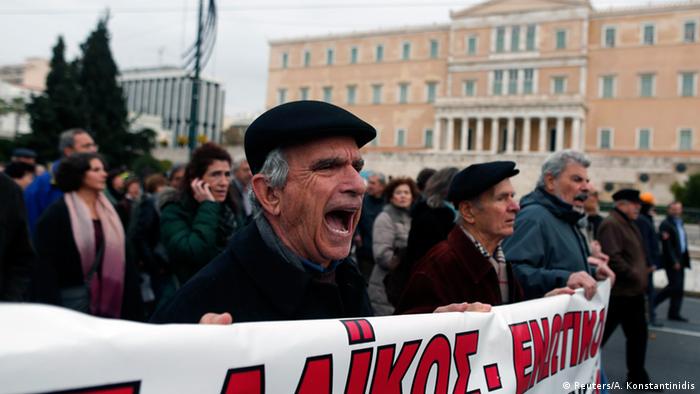Tens of thousands march against austerity measures in Greece
Greece has come to a standstill after tens of thousands of workers took to the streets in a 24-hour nationwide strike. New austerity policies and tax raids have ignited further discontent among the Greek population.
Nationwide chaos ensued on Thursday as tens of thousands of Greek workers rallied in major cities across the country in a 24-hour strike.
The strike was called by the country's largest private and public sector unions, GSEE and ADEDY, a day after crucial talks between Greece and its EU-IMF creditors failed to break a deadlock on the country's planned budget and reform agenda for 2015.
"We are responding to the dogmatic insistence of the government and [creditors] for further austerity policies and tax raids," the GSEE said.
'Taxes, taxes, taxes'
According to police, some 18,000 people demonstrated in Athens and another 6,000 in Thessaloniki, as well as further protests in Greece's major cities.
Air, rail and ferry services across the country ground to a halt and state-run schools closed for the day. The nationwide strikes also forced hospitals and ambulance services to rely on emergency staff.
Hundreds of domestic and international flights were cancelled or rescheduled as air traffic controllers also joined the strike at midnight. Court trials are also expected to be affected in the coming days after prison staff and court employees also joined the walk out.
"The only thing we do is pay taxes, taxes, taxes, taxes," said one protester, Skevos Halkitis.
Thursday's national walk out came just a day after journalist strikes caused a news blackout across Greece. Journalist unions protested against job losses and cuts to pensions and benefits. Hundreds of private sector journalists have gone unpaid for months.
Austerity measures
Greece has implemented huge spending cuts and extensive tax hikes after receiving billions of euros in international bailouts in 2010, with unemployment remaining above 26 percent.
"For the past six years, Greek society has suffered and is being strangled economically by measures taken by the government and our European counterparts," said protester Xanthi Karadima on Thursday. "People can't take it any longer".
The economically troubled EU member state has also failed to win the approval of the so-called troika of international creditors for its 2015 budget.
The group, which includes the European Union, the International Monetary Fund and the European Central Bank, has estimated that Greece needs to save between two and three billion euros (2.5 billion to 3.7 billion dollars) in 2015, if it is to have any chance of meeting it's primary surplus target of 3.0 percent of economic output. The Greek government, however, considers this figure to be too high.
The December 8 deadline for the government of Greek Prime Minister Antonis Samaras to clinch the next tranche of its bailout before EU finance ministers meet is also looming.
ksb/lw (AFP, dpa) dw de


No comments:
Post a Comment